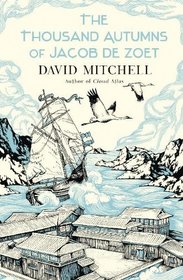The book is broken into four parts: The first part is straight-forward historical fiction with a frisson of romance (talk about the ultimate meet-cute; it involves a monkey and a severed limb). And I must admit that this part drags a little. As I listened, I despaired that I had 18 disks left, but by 2/3rds of the way through the Part, I was hooked. The second part comes at you out of left field - you will simply not believe what yuo are reading (hearing). To say it is a mystery/supernatural story is not too far from the truth. The third part switches again to a war story. The fourth part ties up the story very neatly (and you know how I love a book with no loose ends!).
I loved the way the author gave many of the characters intricate and absorbing pasts which he found a reason for them to recount to Jacob. I loved Jacob - prig though he could be. I loved the way the author wove Japanese philosophy into the plot so that you could see how a westerner might expect the plot to turn one way but suddenly you would see how it needed to turn the other due to the setting. I loved the suspense. More than once I sat in my car listening because I could not wait to hear how a situation turned out.
Excellent, excellent book! You will not regret spending time with this one.
The Thousand Autumns of Jacob de Zoet is an engaging historical novel set in Japan on the cusp of the nineteenth century. Jacob de Zoet is a bright, upstanding Dutchman who signed up for a five-year stint with the Dutch East Indies Trading Company, hoping to gather a fortune sufficient to impress his wealthy fiancée Anna's father into giving her hand. He arrives in Dejima, the artificial island outside Nagasaki which is the sole trading post in Japan for two centuries, to find corruption, courtly intrigue, and Japan off-limits except through a guild of interpreters. Nonetheless, he becomes intrigued by Orito Aibagawa, a skilled, disfigured midwife who studies with the Dutch doctor in Dejima.
Here the story becomes interesting but convoluted and far-fetched. Orito is sent away to a shrine run by a mysterious order; an English warship tries to force the trading port to be open to them. These long interludes seem like diversions from Jacob's story, instead of a seamless execution of David Mitchell's intention to write a bicultural novel. Yet I think he did an excellent job bringing this historical moment to life. While I enjoyed the humor, wit, and the italicized thoughts of various characters, I found Mitchell's frequent use of criss-crossing phrases with ellipses slightly gratuitous. Nonetheless, I enjoyed this off-the-beaten-path romance and adventure long-listed for the 2010 Booker Prize.




